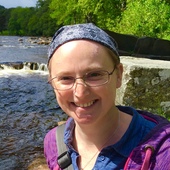
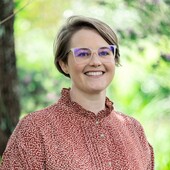
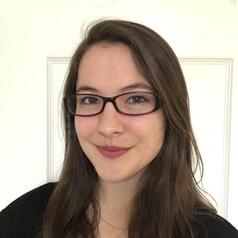
Megan Delamer
Graduate Student, Department of Astronomy, Penn State
I am a graduate student at Pennsylvania State University, currently working with Suvrath Mahadevan. I work on a host of topics relating to the detection and characterization of exoplanets, but I'm particularly interested in the formation of giant planets around low mass stars.
Less ![]()
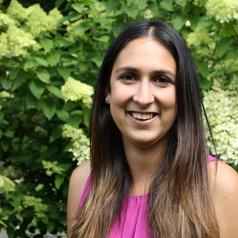
Megan Dias
PhD Candidate, The University of Texas at Austin
Megan Dias is a PhD Candidate in Political Science at the University of Texas at Austin. She study the policies and politics of immigrant political incorporation in the United States on a local level. She explores why cities across the country have passed inclusive policies for immigrants, specifically looking at the role that immigrant-serving organizations and advocacy groups play in this process.
Prior to starting her PhD, Megan held several different roles at organizations dedicated to building more inclusive democracies. She worked at an immigrant settlement center, at a think tank, and as a “get out the vote” coordinator. For the past five years, Megan has supported the Institute of Future Legislators at the University of British Columbia.
Less ![]()
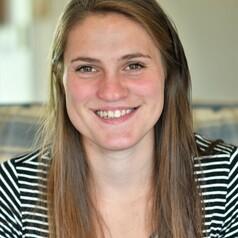
Megan Dolman
PhD candidate in Ecology, Evolution and Behavior, Boise State University
Meg is interested in human-environment interactions. Her current research involves understanding the spatio-temporal dimensions of human development and wildfire in sagebrush ecosystems. She is a PhD candidate in the Ecology, Evolution and Behavior PhD program at Boise State University.
Less ![]()
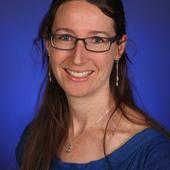

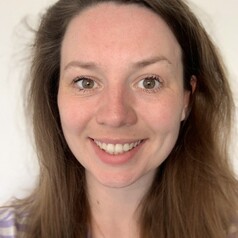
Megan Hall
Clinical Research Fellow, King's College London
Megan Hall is currently a research fellow at King's College London in obstetrics and gynaecology. Her research interests include the prediction, prevention and management of preterm birth, and the use of imaging techniques to better understand fetal development.
Less ![]()
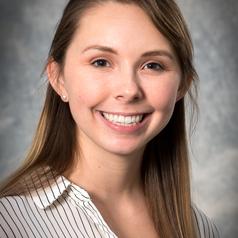
Megan Keller
Ph.D. Candidate in Microbiology, Cornell University
A microbiologist by training and a writer by passion. I research the mechanisms behind antibiotic tolerance and how this process relates to other cellular processes. With an aspiration to bridge the gap between academia and the public, I have spent time bettering my communication skills through various workshops, programs, and seminars.
I enjoy outreach programs where I get to directly connect with my local community. I taught a class on sewage and public health this past semester to over 20 undergraduates. I additionally started my own website and write for The Cornell Daily Sun. I am excited to expand the scope of my audience through The Conversation!
Less ![]()
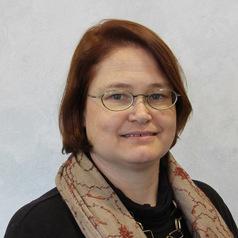
Megan Knight
Associate Dean, University of Hertfordshire
Megan Knight completed her PhD on "The impact of changing media technology on the practice of journalism" at the University of Central Lancashire. She has worked extensively as a journalist and webmaster for news organisations ranging from alternative weeklies in Vancouver to the Daily Star, the Sunday Independent and the South African Broadcasting Corporation in Johannesburg. She is the co-author (with Clare Cook) of Social Media for Journalists: Principles and Practice (Sage, 2013) and researches the impact of new media technologies on the practice of journalism. Her current research is on Facebook as a news source and its impact on awareness.
She has taught journalism and media studies in South Africa at Rhodes University and Tshwane University of Technology, in the United Arab Emirates and in the United Kingdom.
She is an Associate Dean in the School of Creative Arts at the University of Hertfordshire, and a member of the Media Research Group at the same institution.
Less ![]()

Megan Kurlychek
Professor of Sociology, Criminology, and Public Policy, Penn State
Megan Kurlychek is a professor of sociology, criminology and public policy. Her research interests include juvenile justice and delinquency, offender rehabilitation, prisoner reentry, courts and sentencing. Before joining Penn State, Kurlychek was an associate professor of criminal justice at the State University of New York, Albany.
Kurlychek holds a Ph.D. in Crime, Law, and Justice from Penn State and an M.S. in Administration Justice from Shippensburg University. She has worked as a research analyst for the Pennsylvania Commission on Sentencing, the National Center for Juvenile Justice and the Pennsylvania State Senate, and retains a major focus on public policy and evaluation research.
She has been widely published in academic journals, including Justice Quarterly, Youth Violence and Juvenile Justice, Criminology, and Criminology & Public Policy.
Less ![]()

Megan Lim
Head of Young People's Health Research, Burnet Institute
Megan Lim is the Deputy Program Director (Behaviours and Health Risks) and Head of Young People’s Health Research at the Burnet Institute. Her research focuses on the impact of digital technologies on young people’s health and wellbeing.
Less ![]()
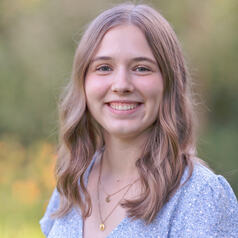
Megan Lindloff
PhD Candidate in Psychology, Western University
I am currently a PhD candidate in psychology at Western University. My research is focused on body and appearance-related stigma, stigma management, well-being, and health.
Less ![]()
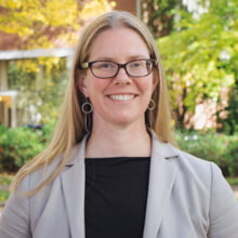
Megan MacDonald
Professor of Kinesiology and School Head, School of Exercise, Sport, and Health Sciences, Oregon State University
Megan MacDonald, Ph.D. is a professor of kinesiology, the School Head for the School of Exercise, Sport, and Health Sciences and the OSU IMPACT for Life faculty scholar - all housed within the College of Health. Her vision is that every child is active and accepted.
Megan works to achieve her vision by conducting high-quality research, teaching and outreach focused on youthful activity for all people.
Her research has been published in high-impact academic journals in her field, and she has disseminated her work at academic and professional meetings nationally and internationally. Her work has also been supported through distinguished funding mechanisms, including the National Institutes of Health (NIH) and the U.S. Department of Education Office of Special Education programs.
Megan earned her Ph.D. from the University of Michigan in 2011, and she disseminates her ideas to the public through various mechanisms, including articles and essays, news interviews, presentations, lectures and op-eds. Her opinions have been featured widely, including U.S. News & World Report, The Hill and the Los Angeles Times.
Less ![]()
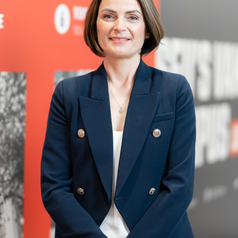
Megan MacKenzie
Professor and Simons Chair in International Law and Human Security, Simon Fraser University
I am Professor and Simons Chair in International Law and Human Security in the School for International Studies at Simon Fraser University, Canada. My research focuses broadly on military culture and gender and war. I am the author of Good Soldiers Don't Rape: the stories we tell about military sexual violence (Cambridge 2023) and Beyond the Band of Brothers: the US military and the myth that women can't fight (Cambridge 2015).
Less ![]()
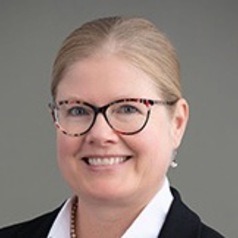
Megan Moreno
Professor of Pediatrics, University of Wisconsin-Madison
Clinical Interests
Moreno is an adolescent medicine physician interested in complex medical conditions and the intersection of physical and mental health among adolescents.
Research Interests
Moreno’s research focuses on the intersection of technology and adolescent health. She is principal investigator of the Social Media and Adolescent Health Research Team (SMAHRT). In addition to research projects, SMAHRT leads two research programs: 1) the Technology and Adolescent Mental Wellness (TAM) program, which funded research, built a community of professionals around this topic, and includes a TAM Youth Advisory Board that is an integral part of the program’s mission and function, and 2) the Summer Research Scholars program, which provides adolescents exposure and experience in research in the area of adolescent health and social media as investigators.
Professional Activities
Dr. Megan Moreno is tenured professor and interim chair in the Department of Pediatrics. Nationally, Moreno is co-medical director of the American Academy of Pediatrics (AAP) Center of Excellence: Creating a Healthy Digital Ecosystem for Children and Youth. She has served as a reviewer for more than 30 journals in the fields of pediatrics, adolescent health, medical education, digital health, behavioral health, and public health and currently serves as associate editor of JAMA Pediatrics and editorial board member for the Journal of Adolescent Health. She is the recipient of dozens of honors and awards, including an AAP Council of Communications and Media’s Holroyt-Sherry Award for Career Achievement (2020), an American Pediatrics Society Norman J. Siegel New Member Outstanding Science Award (2021–2022), and a UW–Madison WARF Kellett Mid-Career Fellowship (2021).
Education
BA, Northwestern University, Evanston, Illinois
MD, George Washington University, Washington, District of Columbia
Residency, Pediatrics, University of Wisconsin, Madison, Wisconsin
Chief Residency, Pediatrics, University of Wisconsin, Madison, Wisconsin
Master of Education, University of Wisconsin–Madison, Madison, Wisconsin
Fellowship, Adolescent Medicine and STD/HIV Research, University of Washington, Seattle, Washington
Master of Public Health, University of Washington, Seattle, Washington
Less ![]()
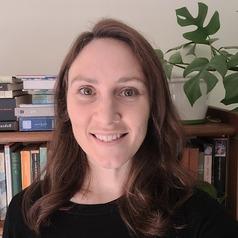
Megan Nash
Casual Academic, School of Art, Communication and English, University of Sydney
Megan teaches in literature and film at The University of Sydney. Her research interests are in the eighteenth- and nineteenth-century novel, with a particular focus on its histories and theories of emotion. Trained in both arts and science, she employs her cross-disciplinary training in a research practice that operates at the juncture of the two.
Less ![]()

Megan Phifer-Rixey
Assistant Professor of Biology, Drexel University
Megan Phifer-Rixey is an assistant professor in the Department of Biology at Drexel University. She is an evolutionary biologist, and her research is motivated by the challenge of making connections between genotype, phenotype, and fitness, especially for complex traits and in the context of changing environments. The Phifer-Rixey lab uses many different approaches—combining genomics and population genetics with fieldwork and organismal functional studies. The lab also investigates fundamental questions in evolutionary genetics relating to adaptation, speciation, and demography, primarily focusing on wild house mice. House mice are one of the mostly widely used genetic model systems and they have recently spread around the world in association with humans. This combination makes them a great system for studying evolutionary genetics and the genetics of adaptation to new environments. The lab also collaborates on projects relating to marine genetics and biology education.
Megan earned her B.S. in Biology from Duke University and her Ph.D. in Biology from the University of Pennsylvania. As a Ph.D. student, Megan was awarded a Doctoral Dissertation Improvement Grant from the National Science Foundation. Afterwards, she joined the University of Arizona as a postdoctoral researcher and then continued her postdoctoral work at the University of California, Berkeley with Dr. Michael Nachman. In 2016, she joined the Biology Department at Monmouth University as an Assistant Professor. In 2021, she was awarded an NSF CAREER grant to study the genetics of urbanization in house mice. She joined the Department of Biology at Drexel University in 2023 where she will continue her work in evolutionary genetics with an emphasis on the impacts of urbanization.
Less ![]()

Megan Sarno
Assistant Professor of Music, University of Texas at Arlington
Megan Sarno is Assistant Professor of Music at the University of Texas at Arlington. She was previously Visiting Assistant Professor of Music at Carleton and St Olaf Colleges. She earned her PhD at Princeton University in 2016.
Her research focuses on the cultural dimensions of early 20th-century French music. Dr. Sarno’s published work includes an article in 19th-Century Music on the music of little-known French composer André Caplet. Focusing on his final work, the song cycle "Le Miroir de Jésus," Sarno uses archival materials, as well as literary and music analysis, to explain subtle layers of meaning in Caplet’s songs. Her 2018 article in Journal of Musicological Research investigates the 1911 stage music of composer Claude Debussy. The work, "Le Martyre de Saint Sébastien," has been long misunderstood. Using literary and music analysis, Sarno argues that Debussy’s music highlights the Symbolist poetic qualities of Le Martyre.
Though her work is focused on French music, Sarno is broadly interested in the social and intellectual function of music—why composers write it and why listeners keep returning to it. Sarno has taught on a wide range of topics, from Baroque and Classical repertory through the music in Disney films. She enjoys teaching music majors and non-majors alike, encouraging students to draw on their own musicality to engage with assignments. Previous courses include American Musical Theater, Songs and Identity, Women and Music, Religion and Music, Disney Movie Musicals, Music of the Cold War, and American Music.
Sarno has presented her work on French music and literary culture internationally and in the United States, at the Society for the American Musicological Society, the North American Conference on Nineteenth-Century Music, Music and the Moving Image, and special meetings on Fauré, Debussy, Saint-Saëns, French Creative Women, and Musical Life in 20th-Century Paris. She has won numerous grants for pedagogical innovation. In 2016, she was the recipient of a Chateaubriand Fellowship, which funded a semester of archival research in Paris, France.
Less ![]()

Megan Sharp
Lecturer in Sociology, The University of Melbourne
Megan (she/her) is a Lecturer in Sociology at The University of Melbourne. Her research focuses on youth, genders and sexualities, subcultures and social inclusion. Megan has received a number of awards and prizes for her teaching, research and engagement activities and has published her work in journals such as Emotion, Space and Society, Journal of Youth Studies, The Sociological Review, and Queer Studies in Media and Popular Culture. Megan is currently the Convenor of The Australian Sociological Association's Genders + Sexualities Thematic Group.
Less ![]()
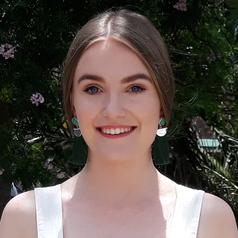
Megan Shaw
PhD Candidate in Art History, University of Auckland, Waipapa Taumata Rau
Megan Shaw is a Doctoral Candidate in Art History at the University of Auckland Waipapa Taumata Rau. She researches elite women in 17th century England, royal favour, cultural patronage and art collections. Her PhD thesis is a cultural history of Katherine Villiers, Duchess of Buckingham (neé Manners, 1603-1649) which was supported by a Junior Fellowship with the Paul Mellon Centre for Studies in British Art. She also has an interest in contemporary art from New Zealand and Australia as the Assistant Manager of the Chartwell Charitable Trust.
Less ![]()
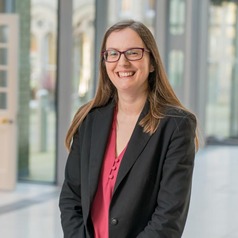
Megan Shirley
Senior Lecturer in Law, Nottingham Trent University
Megan is a Senior Lecturer at Nottingham Law School. She is a module leader and deputy course leader within the postgraduate portfolio. She teaches Civil Litigation and Skills on the LLM Legal Practice Course as well as on specialist practitioner courses providing experiential learning for litigation procedure and skills. Megan also works on the development of new courses that will be launched over the next year.
Megan qualified as a Solicitor in September 2008. She specialised in Commercial Litigation and Professional Negligence and is now continuing to practice as a Solicitor as part of NLS Legal.
Less ![]()

Megan Willis
Senior Lecturer, School of Behavioural and Health Sciences, Australian Catholic University
I completed my PhD at Macquarie Centre for Cognitive Science (now known as the Department of Cognitive Science) at Macquarie University. My PhD research explored the cognitive and neural mechanisms involved in processing emotional expressions and using emotional expressions to guide social judgements. I am now a Senior Lecturer in the School of Psychology at the Australian Catholic University (Strathfield).
My primary research interests are in social cognition, emotion processing and cognitive neuropsychology. My research has focused on understanding the cognitive and neural mechanisms involved in processing emotional expressions and making social judgements. My research also aims to uncover the reasons why certain people have difficulties recognising the emotional expressions of others and using emotional expressions to guide their social judgements. My research has primarily employed cognitive neuropsychological, electrophysiological, behavioural techniques and mild brain stimulation techniques.
Less ![]()
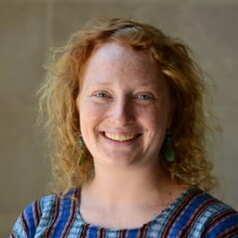
Megan A. M. Griffin
Student Community Engagement Specialist, Connecticut College
Megan Griffin is the Student Community Engagement Specialist at Connecticut College's Holleran Center for Community Action and Public Policy. Previously, she studied Rural Sociology at Penn State, where she focused on issues of gender and agriculture, agricultural labor, critical development studies, and science and technology studies.
Less ![]()
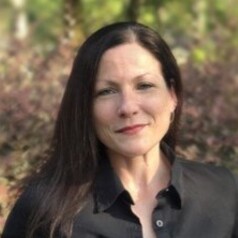
Megan E. Heim LaFrombois
Associate Professor of Political Science, Director of Master of Community Planning Program, Auburn University
Megan E. Heim LaFrombois, PhD, AICP, is an associate professor in the Department of Political Science’s Master of Community Planning program and is a faculty affiliate of the Women’s and Gender Studies program and the Sustainability Studies Minor program at Auburn University. She is currently serving as the director of the Master of Community Planning Program.
Dr. Heim LaFrombois’ research within the planning discipline broadly focuses on community development, participatory forms of city and neighborhood planning, public policy, plan evaluation, urban inequalities, and feminist and qualitative approaches to urban studies and research. With over eight years of experience working in the community development, public policy, and planning arenas - focusing on issues related to ending homelessness in Chicago - an important aspect of her work, both as a practitioner and an academic, is community engagement in addressing inequalities. Her research strives to inform planning practice and policy, and to improve cities and communities.
Dr. Heim LaFrombois is the recipient of the 2020 Community and Civic Engagement Teaching Award from Auburn University’s College of Liberal Arts and the 2016 Alma H. Young Emerging Scholar Award from the Urban Affairs Association. She served as the secretary/treasurer of the Faculty Women’s Interest Group (FWIG) of the Association of Collegiate Schools of Planning (ACSP) from 2021-2023. She is a current member of the American Institute of Certified Planners (AICP).
Less ![]()
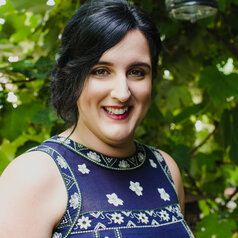
Megan M. Joyce
PhD Student in the Department of Geography, Planning and Environment, Concordia University
Less ![]()

Megan R. Schwarzman
Associate Project Scientist and Continuing Lecturer in Environmental Health Sciences, University of California, Berkeley
Dr. Megan Schwarzman is a physician and Environmental Health Scientist at UC Berkeley’s School of Public Health where her research and teaching focus on endocrine-disrupting chemicals, reproductive environmental health, U.S. and European chemicals policy, and strategies for applying environmental health knowledge to the design and selection of safer chemicals and materials. She is also Associate Director of Health and Environment for the interdisciplinary Berkeley Center for Green Chemistry—a joint center of the School of Public Health, the Colleges of Chemistry, Engineering, and Natural Resources, and the Haas School of Business.
Dr. Schwarzman has served since 2009 on California EPA’s Green Ribbon Science Panel advising the Safer Consumer Products Program, and since 2014 as a member and chair of the Scientific Guidance Panel for California’s biomonitoring program. Her current research includes an assessment of the impact of California’s Proposition 65 on exposure to breast carcinogens and endocrine disrupting chemicals.
After studying history at Haverford College, Dr. Schwarzman earned her medical degree from the University of Massachusetts. She completed specialty training in Family and Community Medicine at the University of California, San Francisco (SF General Hospital) where she earned the Julius R. Krevans Award for Clinical Excellence. She earned a Master of Public Health in Environmental Health Sciences from the University of California, Berkeley in 2007. Dr. Schwarzman also trains family medicine residents in reproductive medicine.
Less ![]()

Megan T. Stevenson
Professor of Law, University of Virginia
Megan Stevenson is an economist and criminal justice scholar. She conducts empirical research in areas such as bail, algorithmic risk assessment, misdemeanors, sentencing and juvenile justice. She was the inaugural winner of the Ephraim Prize given to an “early-career scholar in the field of law and economics whose work has advanced the state of knowledge in the field.” Stevenson was also the 2019 winner of the Oliver E. Williamson Prize for Best Article in the Journal of Law, Economics and Organization.
Less ![]()

Megen de Bruin-Molé
Associate Professor of Digital Media Practice, University of Southampton
Less ![]()
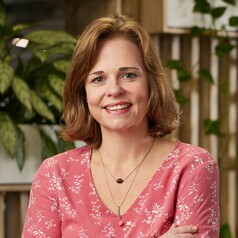
Meggan Spires
Director: Climate Change, Energy & Resilience, ICLEI Africa, ICLEI - Local Governments for Sustainability
Dr Meggan Spires is the Director of the Climate Change, Energy and Resilience Workstream at ICLEI Africa. The workstream she manages serves ICLEI Africa’s network of over 400 cities, towns and regions in over 25 African countries, in terms of supporting their journeys towards climate resilience. Meggan and team manage a suite of multi-year, multi-country programmes and projects in fields such as energy access, climate change adaptation, climate change mitigation, disaster risk reduction, coastal management and ecosystem-based adaptation. The work involves capacity building, policy development, on-the-ground implementation, and unlocking climate finance at the city-scale. She has also performed the role of principal investigator for a number of cutting-edge research into development programmes on the continent.
Less ![]()

Meghan Casey
Senior Lecturer, Exercise Sport Sciences, Federation University Australia
Senior Lecturer and Researcher at Federation University in the Collaborative Evaluation Research Centre and Physical Activity and Sport Insights (PASI).
Promoting sport participation and gender equality
Less ![]()
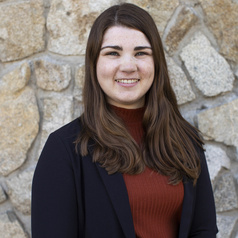
Meghan Corbett
Master's student, Public Administration, University of Victoria
Interested in climate policy and decarbonization, and applying behavioural science to support policy design and behaviour change.
Less ![]()

Meghan Garrity
Assistant Professor of International Security & Law, George Mason University
Meghan Garrity is an Assistant Professor of International Security & Law at the Schar School of Policy and Government at George Mason University. Her research is situated at the nexus of international peace and security, political violence, and forced migration. She is focused on understanding conflict processes by examining the causes of, and constraints on, government policies of group-based ethnic violence and exclusion. Her current book project, “Disorderly and Inhumane: Explaining Government-Sponsored Mass Expulsion, 1900-2020,” explains why and how governments expel ethnic groups en masse. Garrity’s work is published or forthcoming in the Journal of Peace Research, Security Studies, the British Journal of Sociology, Political Science Quarterly, Political Violence at a Glance, and The Washington Post. She also has over ten years of experience as a humanitarian and development practitioner throughout sub-Saharan Africa and the Middle East, and she continues to engage in consultancies with international organizations. Garrity was previously a Postdoctoral Fellow at the Belfer Center for Science and International Affairs at the Harvard Kennedy School, and a Peace Fellow with the U.S. Institute of Peace. She received her PhD in political science from the University of Pennsylvania in 2022.
Less ![]()

Meghan Gosse
PhD Candidate in Sociology, Dalhousie University
I am a SSHRC-funded PhD Candidate in the department of Sociology and Social Anthropology at Dalhousie University. My research has mainly focused on reproductive and sexual health, while my PhD research examines women-identified individuals experiences living with vaginismus. I have taught courses on Gender and Health and have worked on several research projects related to sexual and domestic violence. In addition to my dissertation, my current research work examines social disconnection and masculinity.
Less ![]()
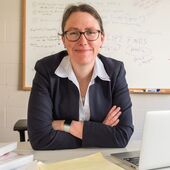
- Market Data























